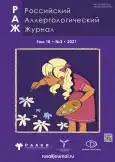Long-term prophylaxis therapy in patients with hereditary angioedema in Russia: resolution of the expert Council
- Authors: Bodnya O.S.1, Demina D.V.2, Kuzmenko N.B.3, Latysheva E.A.4,5, Latysheva T.V.4,6, Milichkina A.M.7, Pampura A.N.8, Sizyakina L.P.9, Totolian A.A.7, Uhanova O.P.10, Fedotova N.V.11, Fomina D.S.12,13
-
Affiliations:
- Russian Medical Academy of Continuous Professional Education
- Federal State Budgetary Scientific Institution Research Institute of Fundamental and Clinical Immunology
- Dmitry Rogachev National Medical Research Center of Pediatric Hematology, Oncology and Immunology
- National Research Center – Institute of Immunology Federal Medical-Biological Agency of Russia
- Pirogov Russian National Research Medical University
- Moscow State University of Medicine and Dentistry named after A.I. Evdokimov
- Saint-Petersburg Pasteur Institute
- Veltischev Research and Clinical Institute for Pediatrics of the Pirogov Russian National Research Medical University
- Rostov State Medical University
- Stavropol State Medical University
- Scientific Research Institute – Ochapovsky Regional Clinic Hospital of Krasnodar Region
- Сlinical State Hospital №52
- The First Sechenov Moscow State Medical University (Sechenov University)
- Issue: Vol 18, No 3 (2021)
- Pages: 126-130
- Section: Letters to the editor
- URL: https://journals.rcsi.science/raj/article/view/121728
- DOI: https://doi.org/10.36691/RJA1485
- ID: 121728
Cite item
Full Text
Abstract
Hereditary angioedema is a rare (orphan) disease associated with the development of angioedema of various localization caused by the action of bradykinin. The main symptoms of the disease are peripheral angioedema, abdominal attacks (accompanied by severe pain syndrome), edema of the upper respiratory tract, which may lead to asphyxia and death of the patient. Peripheral edema disrupts social and professional activity, the occurrence of facial edema complicates social adaptation, the unpredictability and potential threat to life of edema in the larynx, as well as the lack of effect from standard (systemic glucocorticoid and antihistamines) therapy regimens lead to a low quality of life of patients, a large number of days of disability, hospitalizations, in some cases, premature death of patients.
According to international studies, “on-demand” therapy does not reduce the burden of the disease, and therefore international guidelines emphasize the importance of timely and individualized selection of long-term prevention for patients with hereditary angioedema. Taking into account the appearance of a new drug for long-term prevention in Russia, an Expert Council was held to assess the burden of the disease in Russian patients, determine the proportion of patients who need long-term prevention, criteria for choosing a medication for prophylaxis and the place of Lanadelumab in it.
Full Text
##article.viewOnOriginalSite##About the authors
Olga S. Bodnya
Russian Medical Academy of Continuous Professional Education
Email: os.bodnya@yandex.ru
ORCID iD: 0000-0001-5009-8251
SPIN-code: 8477-0538
MD, Cand. Sci. (Med.)
Russian Federation, MoscowDarya V. Demina
Federal State Budgetary Scientific Institution Research Institute of Fundamental and Clinical Immunology
Email: immunology@mail.ru
ORCID iD: 0000-0002-0342-5368
MD, Cand. Sci. (Med.)
Russian Federation, NovosibirskNatalia B. Kuzmenko
Dmitry Rogachev National Medical Research Center of Pediatric Hematology, Oncology and Immunology
Email: plunge@list.ru
ORCID iD: 0000-0002-1669-8621
SPIN-code: 6281-2729
MD, Dr. Sci. (Med)
Russian Federation, MoscowElena A. Latysheva
National Research Center – Institute of Immunology Federal Medical-Biological Agency of Russia; Pirogov Russian National Research Medical University
Author for correspondence.
Email: ealat@mail.ru
ORCID iD: 0000-0002-1606-205X
SPIN-code: 2063-7973
MD, Dr. Sci. (Med.), Senior Research Associate
Russian Federation, 24, Kashirskoye shosse, Moscow, 115522; MoscowTatiana V. Latysheva
National Research Center – Institute of Immunology Federal Medical-Biological Agency of Russia; Moscow State University of Medicine and Dentistry named after A.I. Evdokimov
Email: tvlat@mail.ru
ORCID iD: 0000-0003-1508-0640
SPIN-code: 8929-7644
MD, Dr. Sci. (Med.), Professor
Russian Federation, 24, Kashirskoye shosse, Moscow, 115522; MoscowAnzhelika M. Milichkina
Saint-Petersburg Pasteur Institute
Email: amilichkina@yandex.ru
ORCID iD: 0000-0002-9421-7109
MD, Cand. Sci. (Med.)
Russian Federation, Saint PetersburgAlexander N. Pampura
Veltischev Research and Clinical Institute for Pediatrics of the Pirogov Russian National Research Medical University
Email: apampura@pedklin.ru
ORCID iD: 0000-0001-5039-8473
SPIN-code: 9722-7961
MD, Dr. Sci. (Med.)
Russian Federation, MoscowLiudmila P. Sizyakina
Rostov State Medical University
Email: msiziakina@mail.ru
ORCID iD: 0000-0001-5716-4397
SPIN-code: 1125-0350
MD, Dr. Sci. (Med.), Professor
Russian Federation, RostovAreg A. Totolian
Saint-Petersburg Pasteur Institute
Email: totolian@spbraaci.ru
ORCID iD: 0000-0003-4571-8799
SPIN-code: 3369-8560
MD, Dr. Sci. (Med.), Professor, Academician of the Russian Academy of Sciences
Russian Federation, Saint PetersburgOlga P. Uhanova
Stavropol State Medical University
Email: uhanova_1976@mail.ru
ORCID iD: 0000-0002-7247-0621
SPIN-code: 8287-2891
MD, Dr. Sci. (Med.), Professor
Russian Federation, StavropolNatalia V. Fedotova
Scientific Research Institute – Ochapovsky Regional Clinic Hospital of Krasnodar Region
Email: nfedotova23@mail.ru
ORCID iD: 0000-0003-0631-7212
SPIN-code: 2002-2618
MD, Cand. Sci. (Med.)
Russian Federation, KrasnodarDaria S. Fomina
Сlinical State Hospital №52; The First Sechenov Moscow State Medical University (Sechenov University)
Email: daria.s.fomina@gmail.com
ORCID iD: 0000-0002-5083-6637
SPIN-code: 3023-4538
MD, Cand. Sci. (Med.), Associate Professor
Russian Federation, Moscow; MoscowReferences
Supplementary files






